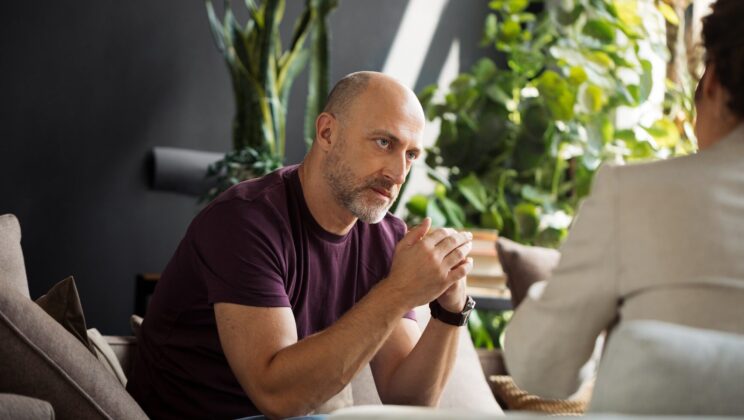What to Expect In Your First Therapy Session
March 7, 2023
A client once told me during her first visit, “I’ve been putting off therapy for too long and finally felt like the time was right. I knew I couldn’t face my problems alone anymore.” Perhaps you have also faced ambivalence about starting therapy in the past but have finally gathered the courage to seek help. And like so many others, you may also be dealing with new or worsening mental health challenges amid the coronavirus pandemic that are prompting you to try therapy. If questions such as, “What happens in the first therapy session ?”or, “How does a first therapy session go?” are running through your mind, you’re not alone. Whatever your reason for getting help, one of the hardest parts is getting started.
How to prepare for your first therapy session
According to a national survey conducted by the Substance Abuse and Mental Health Services Administration, about 52 million adults in the United States lived with mental illness in 2020, or about one in five adults. However, only about 46 percent of these adults received treatment. Meanwhile, one in six U.S. children had a mental health disorder in 2016, but only 50.6 percent received treatment.
For the many people who have yet to seek the mental health care they need, lingering questions about what to expect in therapy can create added anxiety. What follows are some general guidelines to help you prepare for your first session with a therapist, and hopefully to ease some of that uncertainty.
First therapy session: What to expect?
There are many persistent myths about therapy that can influence a person’s decision to avoid it. Knowing how to separate fact from fiction when it comes to therapy can help you make those first crucial steps toward getting care.
You probably won’t be lying on a couch for your first therapy session
The idea of being expected to lie on a couch and open up about your childhood is one I often hear from new clients. Therapy is intended to be a supportive environment that may involve learning a specific set of skills to tackle life’s challenges in healthy ways. Pre-pandemic, most therapy sessions were conducted face-to-face, but video therapy has quickly taken its place.
Teletherapy makes it faster and more convenient for people to access help from home. (You can learn more about the benefits of video therapy here.) Make sure you have a private space in your home and are able to set aside an hour of time weekly or bi-weekly to connect with your therapist via video. If you share your home with others, ask them to wear headphones, move to another room, or take a walk during your session.
Therapy is for everyone
There’s a common misperception that therapy is for “crazy people,” or the severely mentally ill. Rest assured that this is far from the truth. In fact, putting off therapy can cause smaller, more manageable issues to fester and worsen over time. The longer you wait, the harder it may be to tackle your issues.
Not all therapies are the same
Another widespread myth is that all therapies are the same. In reality, there are a variety of evidence-based therapies, or those that have been tested by researchers and proven effective in reducing symptoms of stress, anxiety or depression. These therapies are typically short-term and goal-directed, and emphasize specific practices or skills to work on between sessions. As I often tell my clients, “The real work towards change happens outside of our sessions.” In other words, your commitment to practicing these skills in your daily life is essential.
Your first therapy appointment
So you’ve made it to your first appointment and you’re sitting patiently in the virtual waiting room to meet your therapist for the first time. Maybe you’re trying your best to quell your anxiety but find yourself overcome with discomfort as your appointment time nears. To ease your mind, here’s an overview of what you can expect.
What your therapist might ask you
Your therapist will typically introduce themselves and review some documents with you, informing you of the pros and cons of therapy, the limits of confidentiality, their privacy policy, and any additional policies they have in place, such as how to reach them between sessions or their late cancellation policy. One objective of this first visit is to gather information about why you’re seeking care and start formulating ideas about how best to help you.
This process, also known as the initial assessment, involves asking questions about how you’ve been feeling lately, when you think any problems may have started, and what, if any, steps you’ve taken in order to feel better. There may be some additional forms to complete, too. Your first session may look different from subsequent visits that will likely focus more on learning new coping strategies and skills. You may be asked these common first therapy session questions:
- What brings you to therapy?
- How long have you experienced these problems?
- Have you been in therapy before?
- What are ways that you cope with distress?
- Who is part of your support network?
You may experience a range of emotions during your first therapy appointment
Sharing private details with someone you are meeting for the first time is difficult for most people. You may be asked to share unpleasant aspects of your life, perhaps for the first time. Keep in mind that you never have to share more than you’re comfortable sharing, though being open and honest with your therapist is key to feeling better. Sharing difficult thoughts, feelings or experiences from your past may lead to you to experience a range of emotions, from sadness and anger to excitement and hope. While sharing can be tough, many first-time clients express relief in having a safe and supportive environment to talk openly about their problems.
How to start a first therapy session
Organize your thoughts in advance and consider what you want to say in your first therapy session. You might find it helpful to dedicate a few minutes each day to reflect and document important points to highlight. You can also maximize your appointment time by completing initial paperwork beforehand, such as forms or questionnaires that were sent to you before your appointment.
Be open and take an active role in your therapy
Therapists aren’t mind readers, so it’s important to be open about your problems and share what you’re feeling in session. Your therapist can be more effective at helping when you’re forthcoming with answers to their questions. At the same time, it’s important to know your limits. As mentioned, you don’t have to discuss anything you don’t feel comfortable sharing during your first visit. It’s normal to build a sense of trust before discussing more sensitive topics or issues.
Ask your therapist questions
There are no right or wrong questions for your therapist, and they can help you understand what to expect in therapy. Remember, getting to know each other is a mutual experience. You might ask about their training, what type of therapy will be used and how it works, or how long therapy is expected to last. Or maybe you’ve researched your therapist prior to your first appointment. Don’t be afraid to ask clarifying questions or for them to repeat information you didn’t quite understand. Not every therapist is a good fit, and the more you know about your therapist and their style, the more comfortable you’ll feel about therapy overall. Gather information to determine if this working relationship feels like a good match for you. Some questions you might ask include:
- How long have you been practicing?
- What therapy approach(es) do you use? Can you describe them to me?
- How much experience do you have working with people who have similar issues?
- How long does treatment typically last?
- Is the teletherapy platform that you use safe and secure?
- How should I prepare for my video session and what should I do if I have trouble connecting to the meeting?
- Is video therapy as effective as in-person therapy?
Identify the goals of your first therapy session
It’s helpful to establish goals for therapy in order for your therapist to create an effective treatment plan. You can collaborate with your therapist to identify attainable goals to work toward together. These might include learning healthy skills to cope with parenting stress, managing symptoms of bipolar illness, improving your sleep quality, or overcoming your fear of public speaking. Whatever your aims, it’s best to come to your first session with realistic expectations. Your therapist will also help you set expectations and develop a plan toward achieving your goals.
Ending your first therapy session
You’re nearing the end of your first therapy session. What happens next?
If continuing to work together makes sense, your therapist might summarize your first meeting and suggest some possible goals for therapy. You may also learn more about what to expect in follow-up sessions. In some cases, your therapist will teach you a skill or give you an assignment to complete before your next appointment, such as increasing healthy habits like taking a walk or engaging in a mindfulness exercise. Before wrapping up, you and your therapist will likely agree on a second appointment time.
If at the end of your first session, you’re left with unanswered questions, or if your experience is not quite what you imagined, be open about how you feel with your therapist and ask questions. This process is about your mental health and personal growth, and you want to walk away feeling that you’re moving in a positive direction.
Ready to take the first step?
You can get started today if your employer offers Lyra.
Author
Charlene Fuentes, PsyD
Charlene Fuentes, PsyD is the Associate Director of Clinical Programs at Lyra Clinical Associates. Her clinical specialties include Cognitive-Behavioral Therapy (CBT), Health Psychology, and Behavioral Medicine. She has extensive experience in chronic illness management and has developed inpatient and outpatient psychosocial programs for hospitals in the San Francisco Bay Area.
Explore additional blogs

Mental health treatment
How Chronic Illness and Mental Health Intersect

Mental health treatment
Should I Go to Therapy? How to Know if It’s Right for You

Mental health treatment